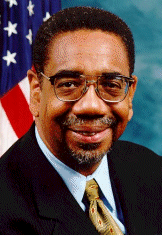Hearing On Triennial Review Order Serves As
Forum For Other Issues
February 26, 2003. The House Commerce Committee's Telecom and Internet Subcommittee hearing on February 26 on the Federal Communications Commission's (FCC) Triennial Review order regarding the Section 251 unbundling obligations of incumbent local exchange carriers (ILECs) also served as a forum for the discussion of other communications and technology related issues. Members of the Subcommittee raised the FCC's media ownership rules, e-rate subsidies for schools and libraries, telemedicine at rural health clinics, E911, internet taxes, and other issues. See, full story.
The event provided the members the chance to speak to all five Commissioners, as well as most of their legal advisors, and many other top FCC staff members, who sat in the audience behind the Commissioners.
Media Ownership. The most frequently raised topic, other than the FCC's Triennial Review order, was the FCC's pending review of media ownership rules.
 Rep.
John Dingell (D-MI) (at right), the ranking Democrat on the full Committee, stated that
the FCC "will soon conclude a proceeding that appears to be aimed at weakening
or eliminating its present media ownership rules. The premise underlying this
proceeding is that the emergence of new media platforms -- in particular, cable
and the Internet -- has created so many voices that we neednít worry about the
tremendous consolidation that continues to occur in the industry."
Rep.
John Dingell (D-MI) (at right), the ranking Democrat on the full Committee, stated that
the FCC "will soon conclude a proceeding that appears to be aimed at weakening
or eliminating its present media ownership rules. The premise underlying this
proceeding is that the emergence of new media platforms -- in particular, cable
and the Internet -- has created so many voices that we neednít worry about the
tremendous consolidation that continues to occur in the industry."
Rep. Dingell said, "Mr. Powell, I challenge that premise. While there has been an expansion of delivery systems, the most watched national news broadcasts, the most popular cable news channels, and the most visited websites for news and information are all owned and controlled by only a handful of companies." See, prepared statement.
In contrast, Rep. Cliff Stearns (R-FL), who has sponsored legislation that would relax media ownership rules, advanced his proposals.
Telemedicine. Rep. Rick Boucher (D-VA) raised "telemedicine service, and what needs to done in order to make it more available in more places in rural America. Almost a year ago, in April of 2002, the Commission issued a Notice of Proposed Rulemaking looking for ways that the rural health care support mechanism could be streamlined and enhanced in order to make services more available to health care facilities in rural America, while staying within the existing statutory framework, and keeping the existing cap in place. I responded to that notice with extensive comments making specific recommendations on ways to that telemedicine service could become more available to more facilities through appropriate Commission action. I know that many other people also responded with comments to your notice. But now, almost a year has gone by, and I am just hoping that you can put this issue forward on your agenda and reach a decision with regard to these much needed regulations, in just the next couple of months." He continued that many clinics in his district would like to provide telemedicine services, but that the current rates are beyond their reach.
Chairman Powell said, "I share your enthusiasm". He said "we will continue to move ahead and try to get this done as soon a possible." See, NPRM [35 pages in PDF] in FCC proceeding titled "In the Matter of Notice of Proposed Rulemaking (NPRM) Regarding the Universal Service Support Mechanism for Rural Healthcare". This is WC Docket No. 02-60. See also, comment [8 pages in PDF] submitted by Rep. Boucher on July 31, 2002.
 Schools and
Libraries. Rep. Bobby
Rush (D-IL) (at right) discussed the FCC's e-rate subsidies for schools and libraries.
He noted that FCC investigations have found "fraud and financial abuse" by
some applicants for e-rate funds. He continued that some institutions are being
denied funds for "minor technical irregularities" on their applications, while
others obtain funds by fraud. He urged the Commissioners to solve this problem.
Schools and
Libraries. Rep. Bobby
Rush (D-IL) (at right) discussed the FCC's e-rate subsidies for schools and libraries.
He noted that FCC investigations have found "fraud and financial abuse" by
some applicants for e-rate funds. He continued that some institutions are being
denied funds for "minor technical irregularities" on their applications, while
others obtain funds by fraud. He urged the Commissioners to solve this problem.
E911. Rep. John Shimkus (R-IL), who is one of four co-chairs of the newly formed E911 Caucus, used his time to question the Commissioners on the impact of the Triennial Review order on E911 services.
Discrimination by Transport Providers. Rep. Boucher also raised the FCC's ongoing broadband regulatory classification proceeding, and discrimination by transport providers. He said that "Companies that own transport, and also are either affiliated with, or directly own a content provider, have the very convenient ability to use their transport mechanism in order to discriminate in favor of their own content or their affiliated content to the disadvantage of the unaffiliated content provider. I think that kind of discrimination is wrong. I think that the transport provider should not slow down access to the competitor's sites. I think that the transport provider should not use his position in order to degrade the quality of the receipt of the program or other transmission of the competitor's site. And I would assume that you would also agree with that kind of conduct is wrong, it is anti-consumer, and should be unlawful under Commission regulation."
He asked if the Commissioners "would be willing to consider as a part of your broadband regulatory classification proceeding adopting a position that would not allow this kind of discriminatory conduct to occur."
See, the FCC's NPRM [58 pages in PDF], adopted at its February 14, 2002 meeting, and the FCC's notice in the Federal Register. This NPRM pertains to the appropriate regulatory framework for broadband access to the Internet over wireline facilities. This is Docket 02-33.
Internet Taxes. Rep. Chris Cox
(R-CA) used the occasion to solicit support from other members of the
Subcommittee for extending the ban on new and discriminatory internet taxes.
Rep. Cox is the sponsor of
HR 49,
the Internet Tax Nondiscrimination Act, a bill to permanently extend the
moratorium enacted by the 1998 Internet Tax Freedom Act. The 107th Congress passed
HR 1552,
which extended the moratorium until November 1, 2003.
Sen. Ron Wyden (D-OR) is the sponsor
of companion legislation in the Senate,
S 52. See
also, story titled "Rep. Cox and Sen. Wyden Introduce Bill to
Make Permanent Net Tax Ban", in
TLJ Daily E-Mail
Alert No.580, January 10, 2003.